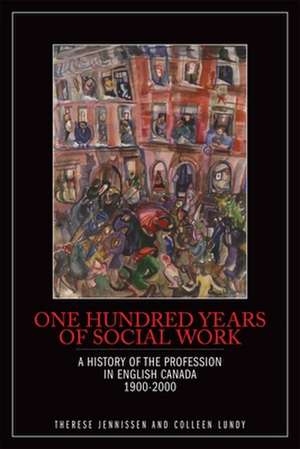One Hundred Years of Social Work
Autor Therese Jennissen, Colleen Lundyen Limba Engleză Paperback – 16 feb 2011
Preț: 296.60 lei
Nou
56.75€ • 59.42$ • 47.07£
Carte tipărită la comandă
Livrare economică 09-23 aprilie
Specificații
ISBN-10: 1554581869
Pagini: 378
Dimensiuni: 151 x 227 x 24 mm
Greutate: 0.55 kg
Ediția:New.
Editura: Wilfrid Laurier University Press
Notă biografică
Therese Jennissen teaches in the area of social policy and social welfare/social work history at Carleton University. She has published work on the gender dimensions of occupational health and safety in the workplace, workers compensation in Canada, and women and social policy. With Colleen Lundy, she has published on the impact of economic transformations on women in Cuba and Russia.
Cuprins
Table of Contents for
One Hundred Years of Social Work: A History of the Profession in English Canada, 1900-2000 by Therese Jennissen and Colleen Lundy
Preface
Acknowledgements
Abbreviations of Organizations and Terms
Chapter One: Responding to Industrial Capitalism and Setting the Stage for Professional Social Work, 1880-1924
Child Welfare
Poverty
The Role of Religion
Planting the Seeds of Social Work
The Settelement Movement
Charity Organization Societies (COS)
Social Work in World War I
Postwar Social Unrest and Labour Conflict
Conclusion
Notes
Chapter Two: Pursuing Professional Status, 1924-29
The American Influence
The Formative Years in Canadian Social Work Education
Formation of a Canadian Social Work Association
The Impact of Pursuing Professional Status
Conclusion
Notes
Chapter Three: Face to Face with Poverty: Social Work in the Depression, 1930-9
Social Workers Respond to Unemployment and Poverty
The Relief Crisis
Social Workers Come under Attack
Housing Conditions
Stretcher Bearers or Political Activists
Left-Leaning Social Workers
Social Casework Challenged
Developments in the CASW
Conclusion
Notes
Chapter Four: Social Work in the War Years, 1939-45: Expansion and Consolidation
Contributing to the War Effort
The Continuation of Peacetime Social Work
Shortage of Qualified Social Workers
Growth and Consolidation in the CASW
Conclusion
Notes
Chapter Five: Postwar Reconstruction and Civil Defence, 1940-60
Social Work and Postwar Reconstruction
The Royal Commission on Dominion-Provincial Relations (Rowell-Sirois), 1937-40
Unemployment Insurance Act, 1940
Report on Social Security for Canada (Marsh Report), 1943
Advisory Committee on Health Insurance (the Heagerty Committee), 1942-43
The Committee on Housing and Community Planning (the Curtis Committee), 1944
The Family Allowances Act, 1944
The Dominion-Provincial Conference on Reconstruction, 1945
Keeping an Eye on Child Welfare
Social Work and Civil Defence in Times of Peace
Conclusion
Notes
Chapter Six: Social Work in the Cold War Era, 1940-60: Radicalism and Repression
The Daycare Movement
The Peace Movement
The Canadian Peace Congress
Social Workers for Peace
The Case of Mary Jennison: A Victim of Anti-Communist Witch Hunts
The RCMP "Red List"
Conclusion
Notes
Chapter Seven: A Conservative Era in Social Work: The 1950s
Formalizing a Code of Ethics
Welfare Planning as Social Action
Abolition of the Death Penalty
The Doukhobor Situation
Revisiting the Social Action Mandate, 1956-58
Conclusion
Notes
Chapter Eight: The Struggle for Workplace Improvements and Standards: The Role of Unions and Professional Associations
Social Work and Unions: An Uneasy Alliance
Social Workers, Staff Associations, and Unions
Vulnerability of Social Workers: A Case Example
Social Workers in High Demand and Short Supply
Inadequate Training
Salaries and Conditions of Work
Social Workers Prepare to Strike
Conclusion
Notes
Chapter Nine: Provincial Autonomy and Reorganization in the CASW, 1950-65
The "Manpower" Crisis in Social Work
Restructuring of Role and Function
Provincial Autonomy
The Move to Provincial Associations: British Columbia
Developments in Quebec
New Directions for the CASW
Conclusion
Notes
Chapter Ten: Advancing Social Work Education, 1950-70
US Influence on Social Work Education
Organizing Social Work Education in Canada
The National Committee of Canadian Schools of Social Work (NCCSSW)
Canadian Committee on Social Work Education (CCSWE)
Canadian Council on Education and Personnel for the Social Services (CCEPSS)
Social Worker Shortage and Social Welfare Workers
Meeting the Challenges in Social Work Education
The Unwelcoming University
Conclusion
Notes
Chapter Eleven: Legal Regulation of Social Work: The Last Stage in Professionalization
The Process of Professionalization
Legal Regulation: A Troubled Relationship with the State
A Patchwork of Regulatory Legislation
Convincing Government and Social Work
The Impact of Professionalization
Conclusion
Notes
Chapter Twelve: Staying the Course: Choosing Professional Status over Progressive Politics
Selective Responses to Government Initiatives
Initiatives by Provincial Associations
The CASW Critiques Its Own Responses to Government
Silence on the Status of Women
Housing and Urban Renewal
The Absence of the CASW in Social Workers' Political Struggles
Going It Alone: Bridget Moran's Battle with British Columbia's Social Credit Government
Accountability and Ethics in Social Work Practice: The Warrendale Affair
Exercising the Left Wing: Social Workers Promoting Social Change
Conclusion
Notes
Chapter Thirteen: Social Work in a Declining Welfare State, 1974-2000
Cutbacks to the Welfare State and Changes in the Profession, 1974-89
Malaise in the Profession
Social Work Practitioners Shift to the Left
Persecution of a Left-Leaning Social Work Professor
A Wholesale Attack on the Welfare State, 1989-2000
Responses from the Social Work Community
Social Work Demonstrates Its Relevance
Conclusion
Notes
Chapter Fourteen: One Hundred Years of Social Work: Looking Back and Moving Foward into the Twenty-First Century
A Time of Transition
Social Work Entering the Twenty-First Century: An Uncertain Time
External Challenges
Challenges Internal to the Profession
The Ongoing Struggle to Address Our Inherent Contradictions
Losing Ground in the Workplace and in Society
Fragmentation of Social Work Bodies
Social Work Theory and the Question of Theoretical Robustness
Losing Our Historical Roots in the Peace Movement
Moving Foward
Fighting for Control over Our Work
Returning to Our Legacy of Resistance
Reinvigorating Our Theory Base
Promoting Social and Economic Justice, Not Charity
Note
Appendix A: CASW Branches, 1927-58
Appendix B: CASW Presidents, 1926-2001
References
Index










